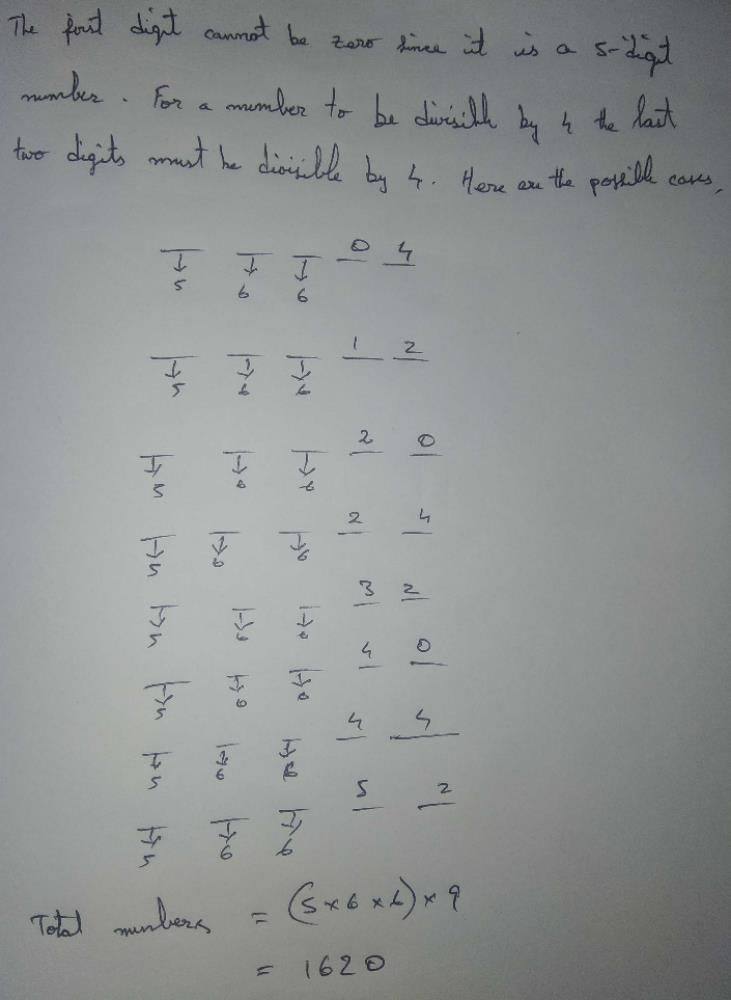JEE Exam > JEE Questions > Total 5-digit numbers divisible by 4 can be f...
Start Learning for Free
Total 5-digit numbers divisible by 4 can be formed using 0,1,2,3,4,5 when the repetition of digits is allowed is: (A) 1250 (B) 875 (C) 1620 (D) 1000?
Most Upvoted Answer
Total 5-digit numbers divisible by 4 can be formed using 0,1,2,3,4,5 w...
Solution:
To form a number that is divisible by 4, the last two digits must form a number that is divisible by 4.
The last digit can be either 0, 2, or 4 as these are the only even digits given in the problem.
Now, let's consider the possible combinations of the last two digits that form a number divisible by 4.
- 04, 12, 20, 24, 32, 40, 42, 50, 52
- There are 9 different combinations.
For each of these combinations of the last two digits, we can choose any digit from 0 to 5 for the first three digits.
- There are 6 choices for each of the last two digits, and 6 choices for each of the first three digits.
- Therefore, the total number of 5-digit numbers divisible by 4 that can be formed using 0,1,2,3,4,5 when repetition of digits is allowed is:
- 9 x 6 x 6 x 6 = 1458
However, we must subtract the number of 5-digit numbers that have a leading zero, as these are not considered 5-digit numbers.
- There are 9 x 6 x 6 = 324 numbers that have a leading zero.
- Therefore, the total number of 5-digit numbers divisible by 4 that can be formed using 0,1,2,3,4,5 when repetition of digits is allowed is:
- 1458 - 324 = 1134
Answer: (D) 1000.
To form a number that is divisible by 4, the last two digits must form a number that is divisible by 4.
The last digit can be either 0, 2, or 4 as these are the only even digits given in the problem.
Now, let's consider the possible combinations of the last two digits that form a number divisible by 4.
- 04, 12, 20, 24, 32, 40, 42, 50, 52
- There are 9 different combinations.
For each of these combinations of the last two digits, we can choose any digit from 0 to 5 for the first three digits.
- There are 6 choices for each of the last two digits, and 6 choices for each of the first three digits.
- Therefore, the total number of 5-digit numbers divisible by 4 that can be formed using 0,1,2,3,4,5 when repetition of digits is allowed is:
- 9 x 6 x 6 x 6 = 1458
However, we must subtract the number of 5-digit numbers that have a leading zero, as these are not considered 5-digit numbers.
- There are 9 x 6 x 6 = 324 numbers that have a leading zero.
- Therefore, the total number of 5-digit numbers divisible by 4 that can be formed using 0,1,2,3,4,5 when repetition of digits is allowed is:
- 1458 - 324 = 1134
Answer: (D) 1000.
Community Answer
Total 5-digit numbers divisible by 4 can be formed using 0,1,2,3,4,5 w...


|
Explore Courses for JEE exam
|

|
Similar JEE Doubts
Question Description
Total 5-digit numbers divisible by 4 can be formed using 0,1,2,3,4,5 when the repetition of digits is allowed is: (A) 1250 (B) 875 (C) 1620 (D) 1000? for JEE 2025 is part of JEE preparation. The Question and answers have been prepared according to the JEE exam syllabus. Information about Total 5-digit numbers divisible by 4 can be formed using 0,1,2,3,4,5 when the repetition of digits is allowed is: (A) 1250 (B) 875 (C) 1620 (D) 1000? covers all topics & solutions for JEE 2025 Exam. Find important definitions, questions, meanings, examples, exercises and tests below for Total 5-digit numbers divisible by 4 can be formed using 0,1,2,3,4,5 when the repetition of digits is allowed is: (A) 1250 (B) 875 (C) 1620 (D) 1000?.
Total 5-digit numbers divisible by 4 can be formed using 0,1,2,3,4,5 when the repetition of digits is allowed is: (A) 1250 (B) 875 (C) 1620 (D) 1000? for JEE 2025 is part of JEE preparation. The Question and answers have been prepared according to the JEE exam syllabus. Information about Total 5-digit numbers divisible by 4 can be formed using 0,1,2,3,4,5 when the repetition of digits is allowed is: (A) 1250 (B) 875 (C) 1620 (D) 1000? covers all topics & solutions for JEE 2025 Exam. Find important definitions, questions, meanings, examples, exercises and tests below for Total 5-digit numbers divisible by 4 can be formed using 0,1,2,3,4,5 when the repetition of digits is allowed is: (A) 1250 (B) 875 (C) 1620 (D) 1000?.
Solutions for Total 5-digit numbers divisible by 4 can be formed using 0,1,2,3,4,5 when the repetition of digits is allowed is: (A) 1250 (B) 875 (C) 1620 (D) 1000? in English & in Hindi are available as part of our courses for JEE.
Download more important topics, notes, lectures and mock test series for JEE Exam by signing up for free.
Here you can find the meaning of Total 5-digit numbers divisible by 4 can be formed using 0,1,2,3,4,5 when the repetition of digits is allowed is: (A) 1250 (B) 875 (C) 1620 (D) 1000? defined & explained in the simplest way possible. Besides giving the explanation of
Total 5-digit numbers divisible by 4 can be formed using 0,1,2,3,4,5 when the repetition of digits is allowed is: (A) 1250 (B) 875 (C) 1620 (D) 1000?, a detailed solution for Total 5-digit numbers divisible by 4 can be formed using 0,1,2,3,4,5 when the repetition of digits is allowed is: (A) 1250 (B) 875 (C) 1620 (D) 1000? has been provided alongside types of Total 5-digit numbers divisible by 4 can be formed using 0,1,2,3,4,5 when the repetition of digits is allowed is: (A) 1250 (B) 875 (C) 1620 (D) 1000? theory, EduRev gives you an
ample number of questions to practice Total 5-digit numbers divisible by 4 can be formed using 0,1,2,3,4,5 when the repetition of digits is allowed is: (A) 1250 (B) 875 (C) 1620 (D) 1000? tests, examples and also practice JEE tests.

|
Explore Courses for JEE exam
|

|
Signup to solve all Doubts
Signup to see your scores go up within 7 days! Learn & Practice with 1000+ FREE Notes, Videos & Tests.


























